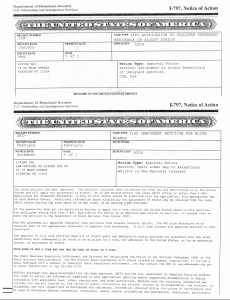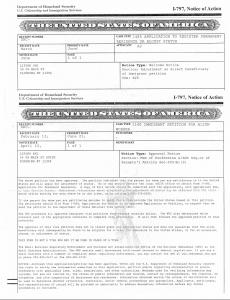NIW (National Interest Waiver)
Aliens seeking a national interest waiver are requesting that the Labor Certification be waived because it is in the interest of the United States. Though the jobs that qualify for a national interest waiver are not defined by statute, national interest waivers are usually granted to those who have exceptional ability (see above) and whose employment in the United States would greatly benefit the nation. Those seeking a national interest waiver may self-petition (they do not need an employer to sponsor them) and may file their labor certification directly with USCIS along with their Form I-140, Petition for Alien Worker.
You must meet at least three of the criteria below* and demonstrate that it is in the national interest that you work permanently in the United States.
EB-1A Extraordinary Ability (EA)
EB-1A Extraordinary Ability (EA) is a subcategory of the EB-1 Employment-Based Green Card. EA qualifies a “small percentage of individuals who have risen to the very top of their field of endeavor.” The individual must be a leader in at least one of the listed areas:
- Sciences
- Arts
- Education
- Business
- Athletics
The applicant must intend to continue working in the same field and be able to demonstrate how his/her expertise would benefit the U.S. If you are unsure whether you fall in the extraordinary ability category it’s best to consult an immigration attorney to determine if you qualify.
EB-1A Requirements:
An applicant wishing to qualify for the EB-1A must be:
- Able to provide evidence of extraordinary ability in the sciences, arts, education, business, or athletics.
- Reputable in your field and have documented confirmation of the applicant’s achievements.
- Continue to work in the recognized field.
- Obtain national or international acclaim.
EB-1A Documentation:
- Evidence of national or international acclaim.
- The EA recipient has national or international acclaim that can be proven with documentation. An example of international acknowledgment demonstrating extraordinary ability would be the Noble Peace Prize or an Academy Award. If the applicant does not possess an internationally renowned award he/she must provide evidence of at least three of the following:
- The applicant has received an award or prize of a slightly lesser national or international recognition.
- Obtained membership in prestigious associations and organizations. Must be perceived as an expert in their fields.
- Assessed the work of others.
- Contributed highly significant original artistic, scientific, or scholarly works in the field.
- Had achievements published in major trade and media announcements.
- Works displayed in an artistic exhibition or show.
- Media success with regard to the performing arts. Can be evaluated based on box office receipts or entertainment sales.
- Make a comparably high salary.
EB-1B Visa: Outstanding Researcher or Professor
An Outstanding Researcher or Professor, or EB-1B, classification applies to aliens who are internationally recognized as exceptional in a particular scientific or scholarly field. Unlike self-petitioned EB-1A visas, EB-1B visas are employer-sponsored. An employer petitions on behalf of an alien, demonstrating that the alien has secured a permanent job offer with the employer and that the alien will continue his or her demonstrably “outstanding” abilities as a researcher or professor in that capacity. Simply put, the employer is the petitioner and the alien is the beneficiary for EB-1Bs.
Who Qualifies?
Aliens residing in the U.S. or abroad are eligible to apply for this designation, provided they meet three general qualifications stipulated by U.S. Citizenship and Immigration Services (USCIS):
- International recognition for outstanding achievements in a particular academic field.
- At least three years of relevant research or teaching experience in that particular academic field.
- Note that research or teaching experience accrued while in pursuit of an advanced degree, such as a Ph.D., can be counted toward this requirement, but only in three scenarios: the alien had already acquired the degree; the teaching duties were such that the alien had full responsibility for the class taught; or the research conducted toward the degree was recognized within the academic field as outstanding.
- Aliens must document their work history with letters from current and former employers describing work duties and duration of employment.
- A job offer for a permanent research position or a tenured or tenure-track teaching position from the sponsoring employer.
- Generally, the job offer is given by a university or academic or scientific institution, but it can also be offered by a private employer. If the offer is from a private employer, the employer must have at least three full-time researchers on its workforce. Additionally, the employer must supply documentation speaking to its own research accomplishments and standing in the relevant academic or research field.
EB-1C Visa: Manager or Executive Transferee
EB-1C was created specifically for managers and executives who meet L-1A nonimmigrant standards and are interested in becoming lawful permanent residents. (L-1A status facilitates a temporary stay in the U.S. for intracompany executive or managerial transferees.) The principal distinction between L-1A and EB-1C is that the latter affords the alien beneficiary permanent residence.
In general, an EB-1C visa is a convenient way for a small or start-up overseas company to expand its business and services to the United States.
PERM (Program Electronic Review Management )
Program Electronic Review Management (PERM) is the system used for obtaining Labor Certification and is the first step for certain foreign nationals in obtaining an employment-based immigrant visa (Green Card). The employment-based preference categories that require PERM Labor Certification are EB-2 (other than a National Interest Waiver) and EB-3. Before a U.S. employer can file an immigration petition for a foreign worker with U.S. Citizenship and Immigration Services (U.S.C.I.S.) in most EB-2 and EB-3 positions, the employer must first obtain an approved Labor Certification from the Department of Labor (DOL). An application for labor certification is submitted to the DOL by using ETA Form 9089. The DOL must certify to the U.S.C.I.S. both that there are not sufficient U.S. workers able, willing, qualified, and available to accept the job offered the alien at the prevailing wage for that occupation in the area of intended employment, and that employment of the foreign worker will not adversely affect the wages and working conditions of similarly employed US workers.
After the Labor Certification is approved by the DOL, an Immigrant Petition related to the Labor Certification should be filed with the U.S.C.I.S. before the expiration of the labor certification.
NIW.
The Labor Certification requirement is waived for a National Interest Waiver (NIW) petition under EB-2 and is not required for any EB-1, EB-4, or EB-5 petitions.
Overall, PERM labor certification is an extremely complicated and time-sensitive procedure.
The Law Offices of Liping Shi, PC are skilled and experienced in this complex process. Contact us at 718 353 8890, info@shilawoffices.com or ShilawNYC@gmail.com for information and assistance.
EB-2 Based on PERM
The EB-2 visa allows those in certain specialized professions – such as doctors, business managers, and educators – who have a master’s degree or higher to gain lawful permanent residence in the US. There are three groups who qualify for the EB-2 visa, with different sub-categories for each:
- EB-2(A): This category is for foreign nationals professionals with an ‘advanced degrees’ (master‘s degree or higher) and with a job offer from a U.S. company
- EB-2(B): This category is for foreign nationals with ‘exceptional ability’ in the sciences, business or arts and with a job offer from a U.S. company
- EB-2(C): This category is for foreign nationals with exceptional ability, or an advanced degree, who can show that their activities will substantially benefit the U.S. national interest (No need for PERM).
EB-2 (A): Members of the professions holding advanced degrees or their equivalent
Applicants for this category must hold an ‘advanced’ degree, meaning at least a master’s degree, or have equivalent qualifications; such as a baccalaureate degree and substantial experience in their field. Usually a minimum of 5 years’ experience is required in the absence of an advanced degree.
Offer of employment
EB-2(A) applicants must have a confirmed US job offer. The job offered must require an advanced degree or equivalent qualifications (baccalaureate degree and at least 5 years of experience in your field).
Criteria
EB-2(A) applicants must provide the following documents:
- Proof of an advanced degree, such as a master’s or PhD OR;
- Proof of a baccalaureate degree and at least 5 years of experience in your field
- Proof of a US job offer which requires an advanced degree or equivalent (baccalaureate degree and at least 5 years of experience in your field)
EB-2 (B): Exceptional ability in the sciences, arts or business
Applicants for this category must show exceptional ability – meaning much greater ability than most in the field – in the sciences, arts, or business; and must have at least 10 years of experience in their field.
Offer of employment
EB-2(B) applicants must have a confirmed US job offer. The job offered must be in line with the applicant’s level of exceptional ability.
Criteria
There are 7 criteria for the EB-2 (B) category. Applicants must provide evidence – in the form of documents – that they meet at least 3 of these criteria:
- Proof of an academic qualification in your field of exceptional ability
- Proof that you have at least 10 years of experience working full time in your field
- A professional license, if needed for your profession
- Proof that you earn a salary appropriate to your level of exceptional ability
- Membership of professional associations in your field
- Proof that your contributions to your field have been recognised by your peers, such as prizes and awards
- Some other proof of your exceptional ability is sometimes accepted, please contact us if you’re not sure if the evidence you have is suitable
EB-2 (C): National Interest Waiver
This visa category allows migrants to enter the US without a pre-existing job offer. EB-2 (C) applicants must demonstrate that they gaining legal permanent residence is in the US’s national interest. Usually applicants must have exceptional ability (similar to the other EB-2 categories) to be considered for this visa.
Offer of employment
No offer of employment is required for this category
Criteria
EB-2 (C) applicants must show that it is in the US’s national interest for them to gain legal permanent residence in. Usually this means demonstrating that they have exceptional ability or talent in certain fields that will make them an asset to the US. There are 7 criteria which demonstrate this ability. Applicants must provide evidence – in the form of documents – that they meet at least 3 of these criteria:
- Proof of an academic qualification in your field of exceptional ability
- Proof that you have at least 10 years of experience working full time in your field
- A professional license, if needed for your profession
- Proof that you earn a salary appropriate to your level of exceptional ability
- Membership of professional associations in your field
- Proof that your contributions to your field have been recognized by your peers, such as prizes and awards




